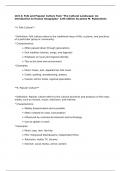Class notes
Lecture notes introduction to human geography (GEO200) The Cultural Landscape: An Introduction to Human Geography, Global Edition
- Institution
- STADIO (STADIO)
class notes for unit 4- folk and popular culture unit 5- languages and unit6- religions
[Show more]



